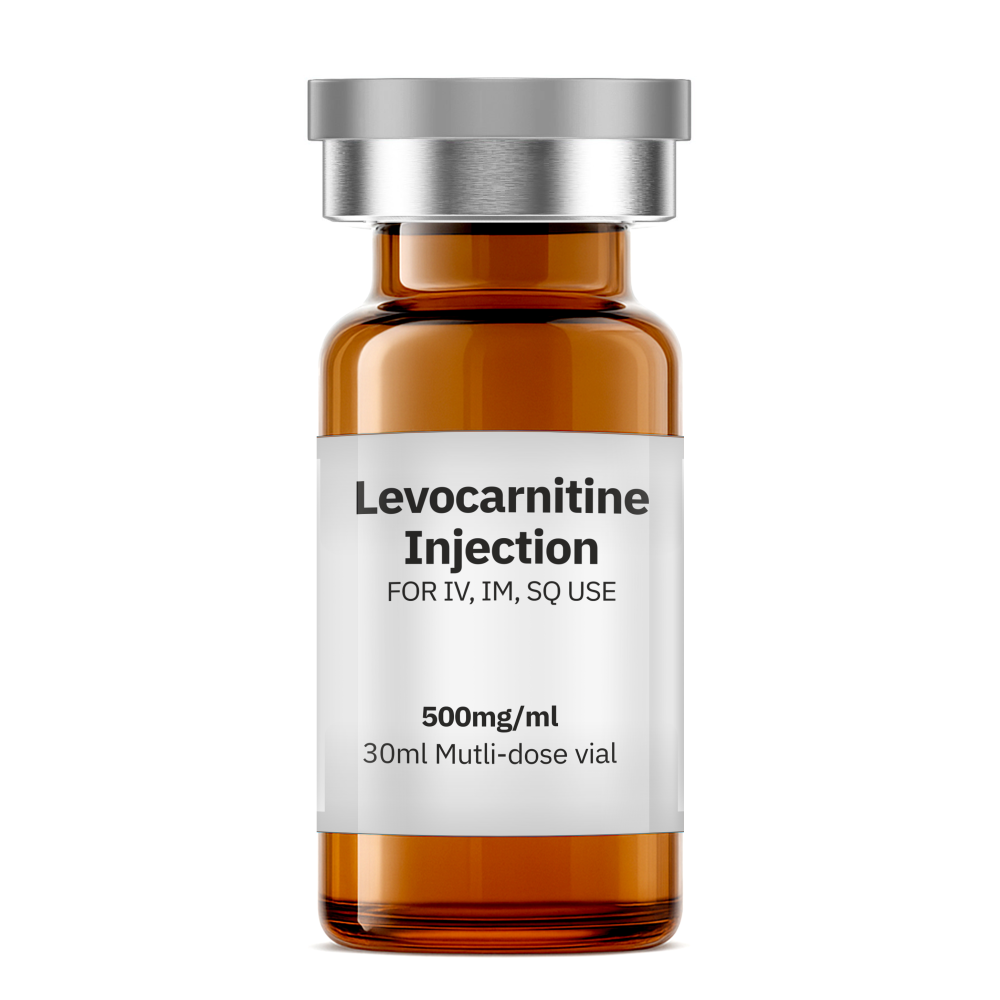
Levocarnitine 500mg/ml (L-Carnitine)
Levocarnitine (also known as L-carnitine) plays a crucial role in maintaining the health of your brain, muscles, and heart. It’s involved in the process of converting fat into energy within your body1. Essentially, it helps transport fatty acids into the mitochondria, where they’re burned for fuel. Levocarnitine injections are used to treat and prevent low levels of carnitine in the body. Carnitine is essential for converting fat into energy and is crucial for the health of your brain, muscles, and heart [1].
Carnitine Deficiency: Often prescribed for individuals with kidney disease on dialysis or those who cannot properly absorb carnitine from their diet [2].
Energy Production: Helps the body turn fat into energy, which is vital for various bodily functions [1].
Available to ship to your site 3-4 weeks after ordered
-
30mL
-
Levocarnitine 500mg/ml
Levocarnitine injections are typically administered intravenously (IV). Here are the general steps for administration:
Dosage: The recommended dose is usually 50 mg/kg, which can be given as a slow bolus injection over 2-3 minutes or by infusion [10][11].
Preparation: The injection is prepared in a sterile environment. The solution contains 200 mg of levocarnitine per mL [4].
Administration:
Bolus Injection: Administered slowly over 2-3 minutes.
Infusion: Can be given over a longer period, often in cases of severe metabolic crisis. The infusion rate and frequency depend on the patient’s condition [10][11]. -
Fatty Acid Transport: Levocarnitine acts as a carrier molecule, transporting long-chain fatty acids across the inner mitochondrial membrane [5]. This process is essential for the β-oxidation of fatty acids, which generates ATP, the primary energy currency of cells [6].
Acyl Group Export: It helps export acyl groups from subcellular organelles and cells to urine, preventing the accumulation of toxic concentrations [5].
Regulation of Metabolic Pathways: By maintaining the acetyl-CoA/CoA ratio in cells, levocarnitine regulates the activity of pyruvate dehydrogenase, an enzyme critical for converting pyruvate into acetyl-CoA, thereby linking glycolysis and the citric acid cycle [6]. -
Allergy: Do not use levocarnitine if you have a known allergy to it or any of its components [7].
Seizures: It may exacerbate seizure disorders, so it should be used with caution in individuals with a history of seizures [4].
Kidney Disease: If you have kidney disease or are on dialysis, levocarnitine should be used under strict medical supervision [7].
Diabetes and Alcohol Dependence: Liquid preparations may contain sugar and/or alcohol, which require caution if you have diabetes, alcohol dependence, or liver disease [7].
Regular Monitoring: Blood tests and monitoring of vital signs are often necessary during treatment to ensure safety and efficacy [4].
-
Gastrointestinal Issues: nausea, vomiting, diarrhea, abdominal pain or cramps [4].
Nervous System: Headache, dizziness [4].
Other:Body odor (often described as a “fishy” smell) Muscle pain or weakness [7].
Serious Side Effects:
Allergic Reactions: Hives, difficulty breathing, swelling of the face, lips,tongue, or throat4.
Seizures: Increased frequency or severity of seizures, especially in individuals with a history of seizure disorders [4].
Cardiovascular Issues: High blood pressure, fast heartbeat [4].
-
Pregnancy and Breastfeeding: Consult your doctor before using levocarnitine if you are pregnant or breastfeeding [4].
-
Temperature: Store at room temperature, between 15°C and 30°C (59°F and 86°F) [8].
Environment: Keep the medication in a closed container, away from heat, moisture, and direct light [4][8].
Freezing: Do not freeze the medication [9].
Children: Keep out of the reach of children [9].
Expiration: Do not use outdated medicine or medicine that is no longer needed [9].
-
1. my.cleveland.org 2. mayoclinic.org 3. msn.com
4. drugs.com 5. go.drugbank.com 6. jissn.biomedcentral.com
7. webmd.com 8. medicinenet.com 9. mayoclinic.org
10. rxlist.com 11. dailymed.nlm.nih.gov -
Levocarnitine has the following drug interactions:
Serious interactions: None.
Moderate interactions: Warfarin (Coumadin, Jantoven) may increase the risk of bleeding when combined with levocarnitine.
Minor interactions: Levocarnitine has minor interactions with at least 24 other drugs [10][8].


